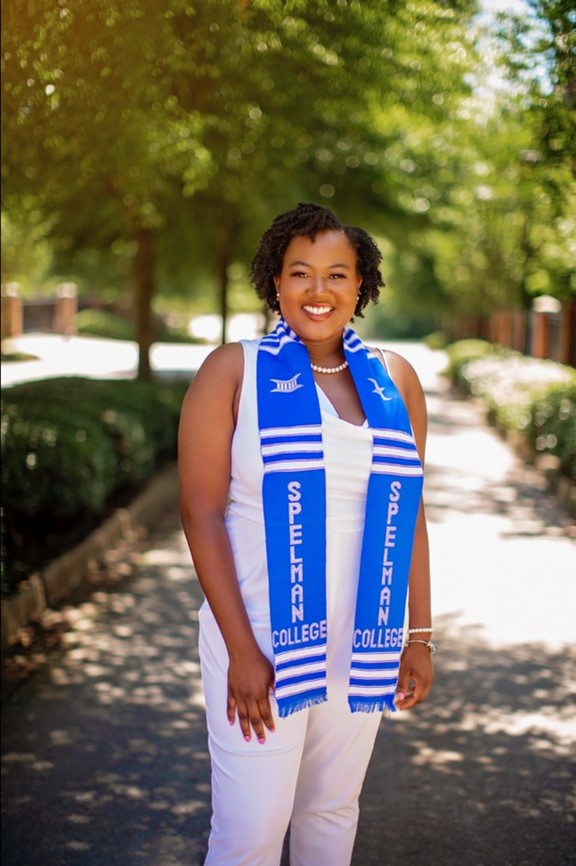Calling all HBCU Grads: Jasmine McClam MPA ’22 on how her HBCU led her to SIPA

Originally from Houston, TX, Jasmine McClam is a second-year MPA student concentrating in Urban and Social Policy (USP) and specializing in Gender and Public Policy (GPP). Prior to SIPA, she graduated from Spelman College with a bachelor’s degree in International Studies and Spanish. While at Spelman, Jasmine travelled to seven countries in Latin America, interned for the U.S. Department of State, worked for the historic Stacey Abrams for Governor of Georgia campaign, and served as the President of the Mu Pi Chapter of Alpha Kappa Alpha Sorority, Inc. As a Thomas R. Pickering Foreign Affairs Fellow, Jasmine will enter the U.S. Foreign Service upon graduating from SIPA.
Which HBCU did you attend? What was your course of study there and how did it affect your decision to come to SIPA?
I attended Spelman College, located in Atlanta, GA, which is a Historically Black College (HBCU) and an all-women’s institution founded in 1881. I come from a long lineage of Spelman women, and I am a fourth generation HBCU graduate. My mother, aunts, and cousins graduated from Spelman College, my father and maternal grandfather graduated from Morehouse College, and my paternal grandparents graduated from Clark College (now Clark Atlanta University). As an International Studies and Spanish double major, I knew I wanted to go into policymaking, but I did not know where it would take me. It was not until I met two Spelman alumnae who were former U.S. Ambassadors on a school sponsored trip that I considered a career in diplomacy. Ambassador Aurelia Brazeal (Columbia alumna) and Ambassador Ruth Davis talked to me about their experiences in the U.S. Foreign Service and encouraged me to apply to the Thomas R. Pickering Foreign Affairs Fellowship. After being awarded the fellowship, I chose to attend SIPA because of its Gender and Public Policy specialization and for the opportunity to connect with diverse public servants from around the world.
What are the most important values from your HBCU that you have brought to the SIPA community? How have you continued to incorporate these values into your coursework and academic activities?
Spelman’s motto and challenge to its students is: “A Choice to Change the World”. Every day I try to live up to this cred through my leadership positions on campus. As the Vice President of the SIPA Student Association (SIPASA) and as a sitting member on the DEICE Committee (SIPA’s diversity and inclusion student/faculty led committee), I advocate on behalf of the student body to ensure SIPA is an inclusive and safe learning environment for all students. In addition, I always try to speak up and speak out in class to share my unique experience as a Black woman and a HBCU alumna.
What are the most important applicable skills that you took from your education at your HBCU that have helped you to succeed at SIPA?
The greatest gift Spelman gave to me was equipping me with the tools to love myself entirely and have confidence in my abilities. Spelman was the first place I truly felt like I belonged in a community and where I felt comfortable in my own skin. Being surrounded by aspirational Black women who looked like me and who shared similar life experiences, gave me confidence in myself and my abilities to be a future change agent. Attending Spelman College broadened my definition of diversity and gave me the power to stand up for myself regardless of where I am in the world in order to take my seat at the table. This confidence has helped me succeed at SIPA.
How can applicants from HBCUs with an interest in international affairs best leverage their academic experience as well as their professional and academic connections throughout the application process?
When I applied to graduate school, I always looked for different opportunities to connect with the schools I was interested in. From attending graduate school fairs, emailing faculty members, to attending admissions events, I was always researching different programs to ensure the school I picked was the right choice for me. I also asked admissions counselors to connect me with current students or alumni who graduated from a HBCU. Connecting with fellow HBCU graduates was an invaluable resource as it allowed me to gain a deeper perspective of the program and provided me with mentors to help me craft my application. If you are a HBCU graduate who is interested in applying or in the process of applying to SIPA, please feel free to reach out to me (jcm2277 (at) columbia.edu)!